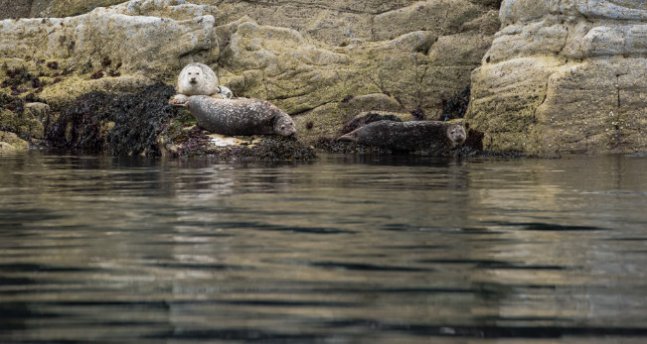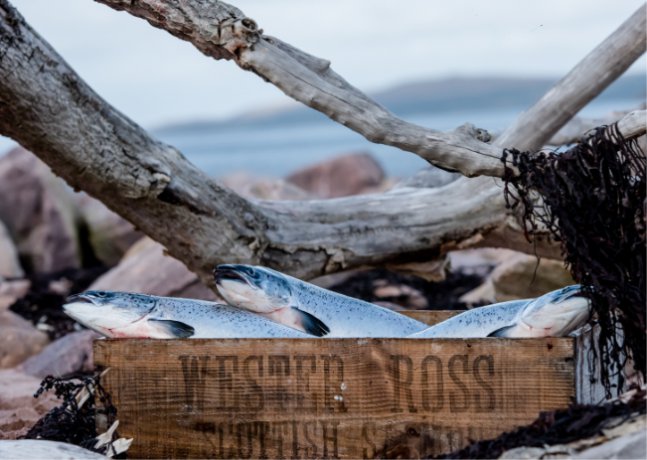Our Unique Approach
Wester Ross is unique in its artisan approach to salmon farming.
An artisan is one who works with low levels of mechanisation, often by hand, using traditional skills and natural methods, to produce something of exceptional quality and provenance. At Wester Ross, we focus on the traditional way of operating, yet we don't ignore the benefits of science and innovation. We draw upon both to optimise our welfare and our operations; with the aim of producing an exceptional salmon. Our core driving principles evidence our sustained committment to doing this; there is no compromise.
Our Heritage
Wester Ross is a county in the Northwest Scottish Highlands where our farms, in the pristine waters of Wester Ross sea lochs, enjoy the benefit of invigorating Atlantic tides. The central point for the Wester Ross Fisheries operation is Ullapool. It’s a whitewashed little coastal town set on the banks of Loch Broom, picturesque and picture postcard; but with a busy and thriving commercial harbour.
Ullapool has a unique connection with America. In the Highland clearances of the late 18th century it was one of the main departure points for families of Scots heading to North America to begin new lives. In honour of their Scottish heritage they named their new land “Nova Scotia”. These strong, historical ties with America have never been broken and Wester Ross today, has a very strong customer base in the USA.
Founded in 1977, by Robin Bradley and Alan Mann, Wester Ross Fisheries is the oldest independently operated salmon farm in Scotland and we have been hand rearing our fish for generations. We currently manage five seawater sites in Loch Kannaird, Loch Broom, Little Loch Broom, Loch Torridon and Loch Alsh. Our farms office is in Ullapool with a sales office in Dingwall.
We farm in Scotland, we are based in Scotland and salmon farming is in the blood of many of the families who have worked with us over the years.
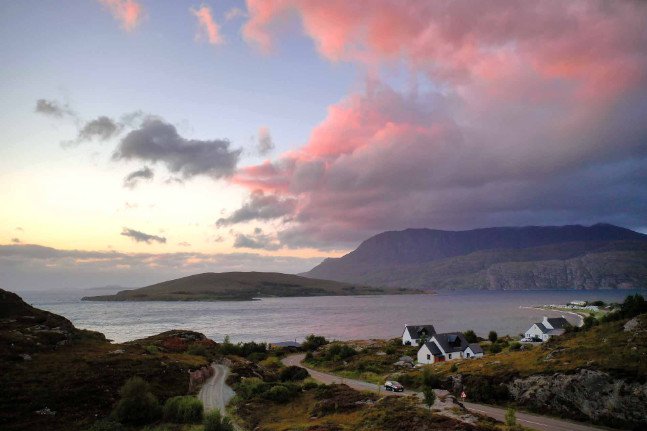
Welfare & Husbandry
The health and welfare of our salmon is of paramount importance to us. Our fish are hand reared, and slowly grown. We practice hand feeding at all of our sea water sites because we believe there is no substitute for experienced eyes on the water. Observation is key to maintaining optimal husbandry.
In the world of salmon farming we are a small farm with the ability to favour traditional and natural practices wherever possible. Our operations are not all automated; we are still able to keep things personal and "hands on". Our teams can spend a significant amount of time with their fish because our staff to fish ratio is higher than the industry average. This ensures our farmers are able to respond immediately to any potential welfare challenge.
Our salmon farmers are on the water every day, all year round, time after time; keeping our fish ever under their watchful eyes. Our stocking density is exemplary with an average of 1% fish and 99% water, providing space to grow, to swim and to thrive. To avoid disturbing the salmon’s naturally protective mucous layer we operate a minimal handling at sea policy so we have a swim through system to enable a low stress transfer of salmon between pens. We have a dedicated marine biologist, and our health technicians carry out random and regular health checks.
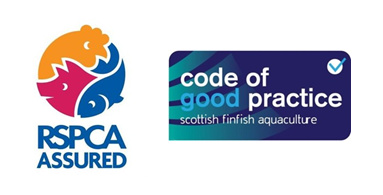
Wester Ross is proud to be RSPCA Assured. The RSPCA program is your guarantee that the welfare of our salmon meets the exacting criteria established by the RSPCA.
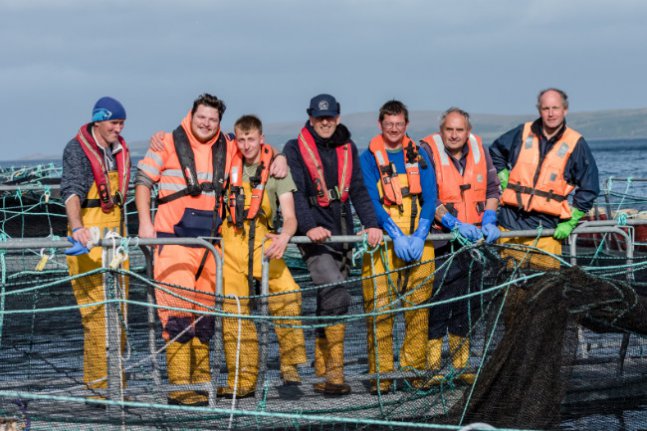
Our Ethics & All Natural Management
We use no antibiotics, hormones, medicines or GMO ingredients in the rearing of our salmon. Our farms have been antibiotic free since 2014. Salmon do need essential pigments for optimum immunity so we give nutritional supplements and naturally occurring Panaferd® pigments, that are derived entirely from natural sources. Our custom designed feed contains approved organic ingredients to satisfy the instinct of the salmon to seek out quality nutrition.
Our fish are hand reared and purposefully slowly grown, we don’t rely upon unnatural management or excessive feeding regimes. Some salmon can reach market size 18 months after hatching but Wester Ross deliberately selects a diet and adopts a feeding practice to grow them significantly slower, reaching market size in 24 – 30 months. We slow grow our salmon this way, so that so they develop over time, producing the superior texture and taste for which Wester Ross is famous.
Keeping our fish healthy is crucially important to us. Sea lice naturally live on wild salmon, but nature is intelligent and there are groups of fish that have evolved to live off sea parasites. Natural parasite control occurs in the wild on account of these symbiotic relationships, and by the fact that sea lice can’t survive in the fresh water when salmon return to the rivers. Consequently, keeping sea farmed salmon healthy and lice free, in pens, and without medicines, needs innovative management.
Wester Ross was the first farm to recreate that symbiotic relationship by introducing Ballan Wrasse to the salmon pens. Wrasse are one of the fish families that have evolved to live off sea parasites and Ballan and Rainbow Wrasse are native to the waters around Wester Ross. It’s a natural and mutually beneficial pairing with our Atlantic salmon. We provide a purpose designed wrasse friendly environment within each salmon pen and one busy little wrasse can keep more than one hundred salmon clean and healthy, just by doing what nature intended.
We draw upon the population of wrasse living in the sea lochs we farm and we fish them sustainably. The wrasse live close to the rocky shoreline and are easily caught, but only those of appropriate size and age are introduced to our pens with the remainder safely returned to the loch. Wester Ross relies upon the knowledge and experience of our dedicated wrasse fishermen to preserve the local wrasse populations by careful selection of individual fish and by considered rotation of wrasse fishing sites.
We try wherever we can, to work with the wisdom of nature. Sea lice cannot survive in fresh water and in the wild, when salmon return to swim up stream and spawn in fresh water, any sea lice they are carrying will consequently fall away. To mimic this natural practice we periodically use fresh water treatments in addition to our busy little "cleaner fish". Keeping our salmon in optimum health is a top priority for us.
Knowledge, experience and skills are being lost from many industries. Wester Ross believes in keeping traditional skills alive and we choose time honoured practices over mechanical management whenever possible. Generations of sea farmers and fishermen have worked these waters and we recognise the priceless value of knowledge gained from experience. So we fish for our wild wrasse, we use local fishermen to hand craft our wrasse creels and we don’t use anti-foulants or chemical cleaners on our nets. We maintain our nets by regularly raising them, hand checking, and exposing them to the cleaning and drying power of the elements, and then we re-use them or take them ashore for hand mending. But most importantly of all: we hand rear our salmon; because only sea farmers can tend fish, monitor welfare and farm without medicines, to grow salmon with the health and vitality that nature intended.
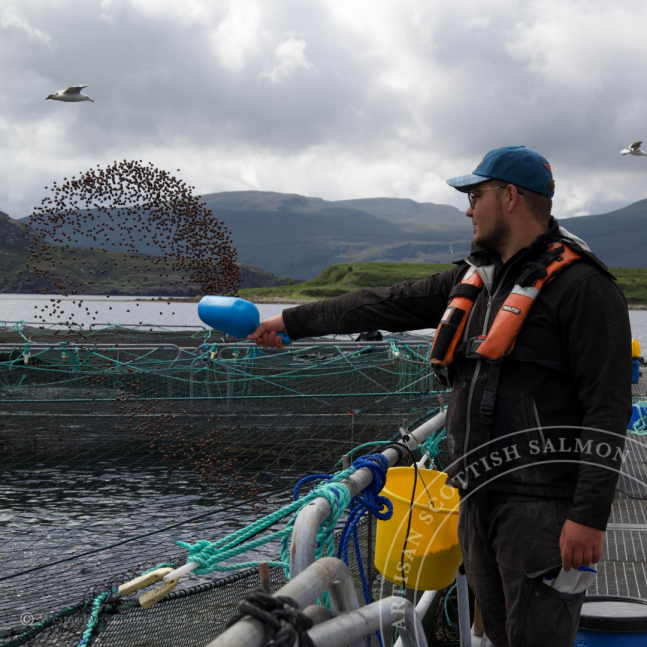
Our Pledge to Sustainability
We have an outstanding “fish in fish out” (FIFO) ratio of less than 1:1. In practice what this means is that we use less than 1kg of marine protein to produce 1kg of salmon and within farming industries that is truly extraordinary.
Our salmon thrive on a marine fishmeal feed that is developed specifically for Wester Ross. Our superior feed contains approved organic ingredients and trimmings of fish that were caught for human consumption, to ensure that our farming operation does not impact upon wild fish populations.
We invest in and support our local community, we buy local whenever we can and we are mindful of our carbon footprint. We recycle, we upcycle, and we don’t use chemical antifoulants or medicines that would not only impact upon the health and purity of our salmon, but would also pollute the sea lochs and affect indigenous marine life.
Our Stewardship & Respect for the Environment
As sea water farmers, we are guardians of the natural aquatic environment and we are committed to sustainable, low impact farming and stewardship of the sea for future generations.
Regulatory permissions for salmon farming are only granted where no long term impact upon the environment can be demonstrated and our sea farms meet ISO14001, the highest environmental management standard. Wester Ross holds the endorsement from the Scottish Industry Code of Good Practice and our sites are monitored continually for environmental impact, with regular, formal measuring of seabed conditions. Our pens, ropes and metals are recycled and although debris is extremely rare, we regularly patrol the lochs around our farms for stray materials.
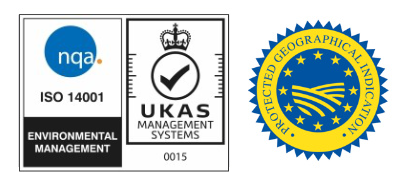
We farm respectfully and sympathetically. One of our sites is adjacent to Isle Martin, a designated Scottish nature reserve and bird sanctuary. We leave no imprint and operate within a thriving and naturally occurring aquatic environment. Our predator nets keep our salmon safe without the need for harmful aquatic life deterrents and we operate in harmony with the environment, alongside dolphins and seals. Marine life thrives within metres of our pens, there is no higher environmental certification.
